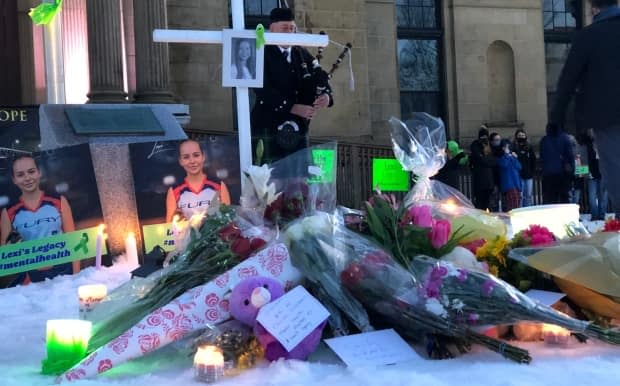N.B. falls short of target to improve system following suicide of teen

Chris Daken isn't sure the government has made enough changes to prevent his daughter's death if she were to walk into an emergency room today — exactly 15 months after she asked for help at a Fredericton hospital and walked out without any.
Even with all of the promised reform, Daken isn't sure Lexi would be given the help that she needed.
"I have the hope that she would have been," he said. "But I would still be skeptical that she would."
Sixteen-year-old Lexi went to the emergency room at a Fredericton hospital on Feb. 18, 2021 and asked for mental health help. After waiting for eight hours, she left without getting any mental health interventions. She died by suicide a week later.
The Maugerville teen's death sparked widespread debate over the gaps in the mental health care system. Health Minister Dorothy Shephard quickly acknowledged that the system was broken and she vowed to fix it.
She immediately asked both of the province's health authorities for input on how to do that. Based on that input, Shephard announced in May 2021 that the government would implement 21 recommendations within the fiscal year that ended March 31.

According to a status report provided to CBC News by the Department of Health, only seven of the 21 recommendations are listed as complete.
Daken isn't pleased with the province's completion rate.
"Do I think the government's done enough yet? My answer is probably 'no,'" he said.
"Am I happy to see that they're doing stuff? My answer is 'yes.' But I do think that they should be doing more and they can be doing more."
He even wonders about the status of the seven that are listed as "complete." Very few of them, he said, improve mental health access in hospital emergency rooms — something he has always hoped would be a priority for the government, given what happened to his daughter.
Among the seven "completed" recommendations is a provincial awareness campaign for addiction and mental health crisis response services, which the province says has already been launched.
The department also says it has already developed and distributed "crisis care education/resource materials to individuals and community service providers," and adapted 811 as a 24-hour addiction and mental health telephone response line.

Twelve of the recommendations centre on mental health care provided in emergency rooms. They included creating a "standardized suicide care pathway" for every patient who presents with suicidal thoughts; better training for staff on how to deal with mental health issues; expanding mental health care teams assigned to emergency rooms, and providing mental health care around the clock.
The recommendations also included having "a warm hand-off" of care following treatment in the emergency room, and "standardizing" the transfer of patients for followup care.
According to the status report from the department, none of the 12 have been completed. All are listed as "in progress" or "ongoing."
Given that, Daken said, "I still kind of question what clinical service a person is still going to get when they go to the ER for some help."
Based on what he's hearing from other families about their own experiences, mental health services in the ER are "hit and miss."
Daken said he hears two kinds of stories — ones that lead him to believe the system hasn't changed since his daughter left the ER 15 months ago, and ones from grateful families who believe their child may not have received mental health help if not for the improvements made since Lexi died.
He heard from one woman whose daughter went to the hospital five times and didn't receive any mental health help.
Eventually, she did get some, said Daken, "but it shouldn't take five trips to the ER to get some help — especially with everything … that's happened within the last year and the media awareness of youth mental health."
While each story chafes at his family's still-raw wounds, he's mostly grateful to hear other people's stories.

"We've said from day one that we want Lexi's death to have some meaning," Daken said. "One person can't do this alone. So, you know, many voices are louder than one."
But one year after Shephard pledged to complete all 21 recommendations, Daken had hoped the government would be further along in reforming the system.
He said he hasn't spoken to anyone from the Department of Health since before the minister announced the recommendations. He had hoped department officials would keep him updated on their progress, but that hasn't happened.
"We've been very public with our story the last year. So, we would like that kind of courtesy from the government [to] let people know what you have and haven't done … I think people just want the transparency of what's being done."
Shephard was asked for an interview but has not provided one — nor has the department responded with a statement.
New Brunswick's child and youth advocate also examined the circumstances surrounding Lexi's death and the province's mental health care system. The report released last September, said her death was preventable, and it made 12 recommendations to try to prevent similar tragedies in future.

In presenting the report, Christian Whalen, the child, youth and seniors' deputy advocate, highlighted the need for better government accountability. He said his department needs more resources to keep track of the government's progress and to keep them "on track."
He said his office will closely monitor its own recommendations and report publicly every six months. That deadline passed in March.
According to a statement released by the advocate's office on Monday, the advocate needs more time to finalize the inaugural report.
"It is still the Advocate's plan to provide updates on this report every six months due to its importance," wrote Heidi Cyr, who does communications for the office of the advocate.
"In the case of this first report, a draft has been prepared and we are waiting for departmental feedback before reporting publicly."
She said the office needs a "few extra weeks" and the first update "should be out shortly."


